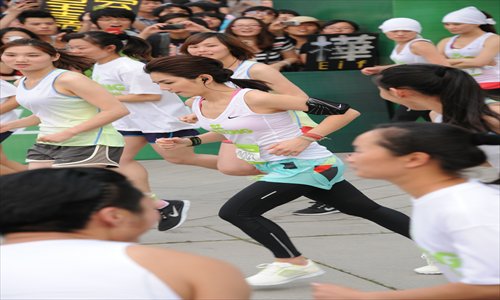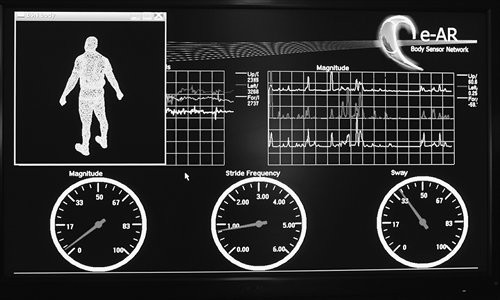The science of the self


In an effort to drop some weight a few years ago, 38-year-old office worker Yao Ming started keeping track of his exercise routine and habits. He logged the time and distance every time he went jogging, as well as his heart rate and the number of calories he burned.
Yao, who works for a telecommunications company, said keeping track of these things made him understand his body better, and the numbers made it easier to have a clear picture of his goals and how to achieve them. In eight months he lost over 20 kilograms.
Back then, Yao didn't realize that what he was doing would later become known as the "quantified self" movement, which sees people keeping track of their daily lives, from sleep and diet to exercise and mood, using computer technology like digital gadgets or apps, or just pen and paper. Such data allows people to better evaluate their habits and make improvements to their health or other aspects of their life.
Birth of a movement
First developed by co-founder of Wired magazine Kevin Kelly and contributing editor Gary Wolf back in 2007, the quantified self movement has been gaining momentum in many countries throughout the world.
The first international quantified self conference was held in 2011 in California. Since then, such events have become more common, and "QS-ers" gather in formal or informal meet-ups in many cities around the world.
Though late in the game, China is slowly joining the movement, and a small group of engineers, scientists and tech-savvy consumers are discovering the power of self-quantifying.
While many consumers in China are probably self-tracking in one way or another, through for instance Nike+ fuelband or mobile apps, they don't necessarily realize the power of this practice.
"Self-tracking and experimentation supports personal science and encourages learning from data rather than trusting experts," said Seth Roberts, a professor of psychology at Tsinghua University and professor emeritus of psychology at the University of California at Berkeley, at a quantified self conference on December 13 in Beijing.
An early QS-er and creator of the Shangri-la diet, Roberts illustrated the power of self-tracking through personal stories. For instance, while in graduate school, he counted the number of pimples on his face and tracked the amount of prescription medication he took, concluding that his medicine did not in fact work. He also created the Shangri-la diet through self-experimentation.
"I think ordinary consumers don't realize how much it could help them," Roberts told the Global Times in an e-mail. "The concept that self-experimentation is worthwhile is missing from their beliefs and how to do self-experiments is missing from their skill set."
Local growth
For now, the quantified self movement seems to be known mainly among IT professionals or people who have the skills and training to analyze the data and experiment with changes. But this is only the beginning in China. The first quantified self event in the country was held in September in Beijing. It was organized by Wallen Mphepö, a research scientist and engineer from Sweden who came to China in 2010, and five high school students from Beijing.
"We just wanted to test the waters and see how many people here are interested," said Mphepö. About 80 people signed up and 40, mostly IT professionals, engineers and other scientists, showed up. It's a small number compared with the conferences that draw thousands of people in the US, but Mphepö believes it's a good beginning.
Some people are already exploring the power of data in realms outside of health. Wang Bolong, the lead singer of punk band Bear Warrior, wanted to find a way to measure the audience response in order to see how well his band really performed.
"If you ask a fan what he or she thinks of the show, they only give you vague feedback like 'it was good,' but nothing specific that we could actually use to improve ourselves," said Wang, whose stage name is "Mr Pregnant." The 24-year-old is also a graduate student majoring in precision instruments at Beijing University of Aeronautics and Astronautics.
In September he set out to design a device called the "POGO Thermometer," which measures the intensity of the audience's dancing.
After three months of trial and error, he embedded several sensors in a carpet that transmit data on people's movements to a computer where it is analyzed. The data is then transformed into graphs to give a clear visual presentation of the audience's response.
Based on his examination of the results from one performance, Wang found that fans started moving their bodies when the drums kicked in, and they danced the most energetically when he sang higher notes.
Wang believes that such data helps the band improve its songwriting, arrangements and performance. He concluded after analyzing the data for one of their songs that the chorus was too monotonous. The audience seemed bored, and they did not respond with much enthusiasm, prompting Wang to consider working on the band's stage presence.
Such data tells performers whether they have delivered the emotion and meaning they wanted to convey through their music, explained Wang. "The data helps us understand how we can improve our performance to make the audience respond to our music like we intend," he said.
The carpet debuted in the band's performance at Mao Livehouse on December 6. Since then he has collected data from more than 10 concerts, including over 20 bands, and has recorded the impact of dancing feet during over 120 songs. Soon he plans to make the data public in order to share findings and adopt better analysis tools.
Advancing knowledge
Still, most people set out to self-quantify in order to improve their health. Roberts believes that self-quantifying will have a huge impact on humanity.
"Many important things about health will be discovered by QS-ers before they are discovered by professional scientists," he said.
After reading about the quantified self movement, Yao began building a community of QS-ers in Shenzhen. So far only nine people have joined his online group. Yao is trying to organize an event for QS-ers, but he expects that this will take time.
"For me, self-quantifying means that we could all learn more about ourselves and take control of our health rather than relying on doctors," said Yao.